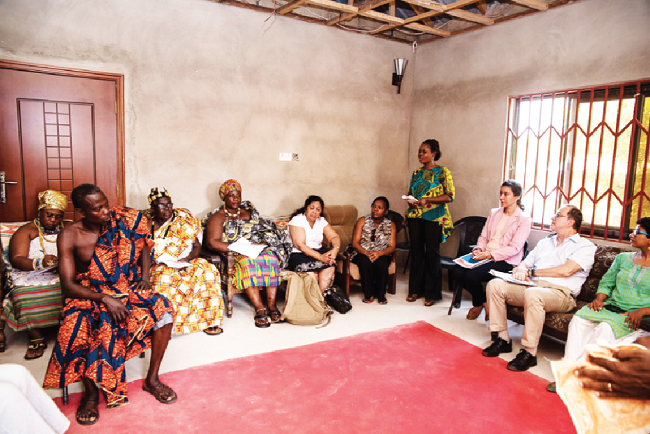
Global Committee visits child marriage project in Sogakope
The UNFPA-UNICEF Steering Committee of the Global Programme to Accelerate Action to End Child Marriage has acquainted itself with an initiative to help girls delay age at marriage and childbearing being implemented in Sogakope in the South Tongu District at the Volta Region.
The project is being implemented by UNFPA Ghana in partnership with Planned Parenthood Association of Ghana, (PPAG).
Known as the SISTAS initiative, the project provides a platform for young girls, aged 10 to 19, to be empowered with health and socio-economic assets to ensure they fulfil their potentials.
The initiative is anchored on Ghana’s Adolescent Reproductive and Health Policy which outlines a package to reduce the vulnerability of girls to teenage pregnancy and galvanise relevant stakeholders and community actors to collaborate to end child marriage.
As part of the initiative, UNICEF Ghana is also partnering with the Department of Social Welfare and the Girls Education Office, the Department of Community Development and a local NGO, Seek to Save Foundation, to provide a second chance education for young mothers.
Call on traditional leaders
Before interacting with the project beneficiaries at the PPAG Young and Wise Centre, the committee members called on the traditional leadership of the district.
Welcoming the team, Torgbe Ayite Awaga IV, the Chief of Fievie Dugama, on behalf of the chiefs and queen mothers, expressed his gratitude to the UNFPA and UNICEF for funding the project.
According to him, teenage pregnancies are common in the various communities at Sogakope leading to school dropout, cohabitation, forced marriages, no livelihood skills and overall disempowerment of the adolescent girl.
Torgbe Awaga IV said the introduction of the SISTAS project, was helping to address the challenges by empowering the girls, providing them sexual and reproductive health information and services.
He said as traditional leaders “we are supporting the SISTAS initiative by participating in stakeholder review meetings, mobilising parents and community members for advocacy and educational sessions, creating an enabling environment for the girls to access sexual and reproductive health information and services as well as addressing human rights issues.”
The acting UNFPA Representative in Ghana, Ms Erika Goldson, thanked the community leaders for their warm welcome and stated that the UN agency would work with the district to address some of the problems identified.
![]()
Young & Wise Centre
Giving an overview of the SISTAS initiative and results achieved, the Assistant Planning Officer at the South Tongu District Assembly, Ms Sefakor Fummey, said “the district has a large youthful population and a high dependency ratio. As a result, poverty is very rife, hence young girls are pushed to engage in sexual relationships to fend for themselves.”
Ms Fummey said the SISTAS initiative, therefore, emphasised on girls’ empowerment and was designed to enable them to take charge of their reproductive health through the provision of information and income-earning skills. She added that the project had multi-stakeholders to prevent it from collapsing should funding from the UN bodies stop.
Milestones
The project, Ms Fummey said, had produced positive results.
“It has reached 1,385 girls in the district. Forty-one of the girls have been trained in beaded jewellery production, professional driving and soap making, while 622 girls have been empowered in public speaking and reading skills.”
In addition, she said, 40 victims of child marriage had been identified. Six of them were supported to go back to school in 2016, and 34 more would be supported by the assembly to return to school this year.
If sustained, she stated, the programme would further decrease teenage pregnancy, unsafe abortion, child marriage and school dropout.
Impressions of visiting team
The team also visited a PPAG clinic run by staff of the Ghana Health Service, which provides sexual and reproductive health services to members of the SISTAS clubs and generally to young people, including teenage mothers, and observed an outreach during which contraceptives and SRH services were provided for members of a trainee dressmakers association.
Giving their impression of the project, Satvika Chalassani of the Technical Division, UNFPA headquarters in New York, noted that the SISTAS initiative was laudable.
She, however, emphasised that for the impact to be significant, the project should exploit avenues to help the adolescents engaged in economic activities to market their products to enable them to generate the needed income to meet their needs.
Meike Vogels of the Dutch Ministry of Foreign Affairs, Netherlands also commended the project beneficiaries for their resolve to improve their lives.
SISTAS Initiative
The model is being implemented in the Central, Volta, Ashanti, Upper East, Upper West and Northern regions. Through the initiative, a total of 32,246 adolescent girls aged 10 to 19 years have been reached. About 10 per cent of these girls were either married or cohabitating at the start of the project. About 88 per cent of the beneficiary communities are rural.
- UNFPA and UNICEF are implementing a multi-stakeholder programme to accelerate action to end child marriage in 12 countries, including Ghana.
- It is being supported by Canada, the Netherlands, Italy, the United Kingdom and the European Commission.
- The Steering Committee of the global programme was in Ghana for its first meeting held in one of the 12 implementing countries.
